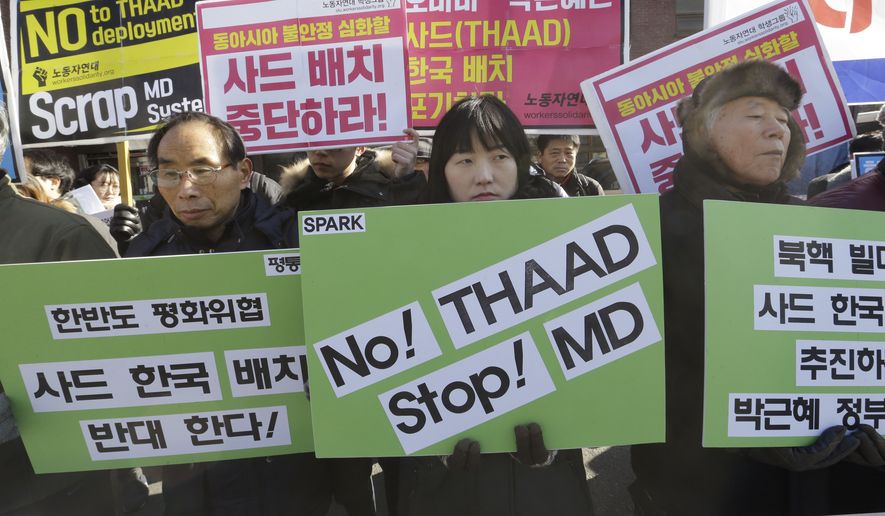China’s top diplomat says Beijing has “legitimate national security” concerns over the potential deployment of an advanced U.S. missile shield to South Korea in response to growing nuclear provocations from North Korea — but Chinese leaders also respect that it will be up to Seoul to “make a final decision” on the matter.
The comments by Chinese Foreign Minister Wang Yi in Washington on Thursday were a departure from Beijing’s long-held and aggressive resistance to the idea that Seoul might allow the U.S. to position the so-called Terminal High-Altitude Area Defense (THAAD) system in South Korea.
“The United States is likely to deploy THAAD in the [South Korea],” Mr. Wang said. “Of course, it’s up to the [South Korean] government to make a final decision. To some extent, it’s their internal affair and China does not interfere in internal affairs of other countries.”
His remarks came a day after South Korean officials warned Beijing not to try and bully Seoul out of accepting the missile system. “This is a matter we will decided upon according to our own security and national interests,” Jung Youn-kuk, a spokesman for South Korean President Park Geun-hye said on Wednesday. “The Chinese had better recognize that.”
Friction over the issue has risen since early February, when Washington and Seoul announced the formalization of talks toward deploying THAAD in response to North Korea’s recent nuclear test and long-range rocket launch — moves by Pyongyang that U.S. officials say were aimed at developing ballistic nuclear weapons.
The talk of THAAD has also drawn the ire of Russia, where officials say it would be an unnecessarily aggressive U.S. military move in North Asia.
Secretary of State John F. Kerry, who held talks with Mr. Wang at the State Department this week, has treaded carefully on the issue while also appearing unapologetic about about Washington’s intentions.
“Russia and China have obviously both expressed concerns,” Mr. Kerry said during a joint news conference with the Chinese foreign minister on Tuesday. “We have made it very clear that we are not hungry or anxious or looking for an opportunity to be able to deploy THAAD.”
“THAAD is a purely defensive mechanism,” the secretary of state added. “It’s not an offensive weapon [and] doesn’t have offensive capability. It is purely capable of shooting down a ballistic missile that it intercepts, and it is there for the protection of Korea and the protection of the United States — if it were to be there.”
While debate over the missile shield’s potential deployment has gone behind the scenes for years, U.S. and South Korean officials have long held off on taking action, mainly out of concern that the shield would anger China.
Chinese state media outlets have carried articles during recent years accusing Washington of stoking tensions with North Korea purely to create a pretext for expanding America’s military footprint in the region.
With some 30,000 U.S. troops already stationed in South Korea and roughly 60 percent of the U.S. Navy’s active assets deployed in the Pacific theater, analysts say, the Chinese believe Washington is bent on doing whatever it takes to position advanced missile systems across Asia.
The Chinese Foreign Ministry initially reacted to the U.S.-South Korean announcement on THAAD by asserting that the system’s deployment would only escalate tensions on the Korean Peninsula and damage regional peace and stability.
The issue has been unquestionably sticky for the Park government in Seoul, which has sought to promote an era of warm relations with China despite Beijing’s ongoing economic support for North Korea. Chinese officials have for years warned that a South Korean embrace of THAAD could damage the growing economic and diplomatic relations between Seoul and Beijing.
But on Wednesday, Mr. Wang suggested Chinese leaders may be willing to accept THAAD’s deployment if Washington can clearly convince them the missile shield will not threaten China’s own national security.
“We understand that in a very complex environment, the United States and [South Korea] want to ensure their own security,” he said in remarks at the Center for Strategic International Studies in Washington.
“But I must point out that the X-band radar associated with the THAAD system has a radius that goes far beyond the Korean peninsula and reaches into the interior of China,” he said. “In other words, China’s legitimate national security interests may be jeopardized or threatened.”
“We believe China’s legitimate security concerns must be taken into account and a convincing explanation must be provided to China,” Mr. Wang added. “I don’t think it’s too much to ask. It’s a reasonable position.”
Some analysts say the Chinese believe the U.S. is engaged in a kind of deception — seeking to position THAAD in South Korea not only as a deterrent to Pyongyang, but also to contain China’s own intercontinental ballistic missile capabilities.
But the reality, according to Bruce Klingner, a senior fellow with the Heritage Foundation’s Asian Studies Center in Washington, is that the system’s technical design would limit its effectiveness against such capabilities.
“Chinese criticism of THAAD is not based on any legitimate security concerns,” Mr. Klingner said during a recent interview with The Washington Times. “The Chinese security concerns are red herrings. What China is really trying to do is divide the U.S. and its allies from upgrading their security capabilities in the region.”
“China,” he said, “perceives anything related to U.S. military development in the Pacific as a dagger aimed at the heart of China.”
• Guy Taylor can be reached at gtaylor@washingtontimes.com.




Please read our comment policy before commenting.